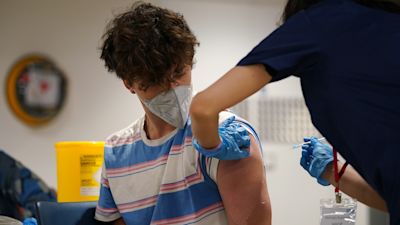Covid: One million coronavirus jab bookings made in two days

More than one million coronavirus vaccines were booked in two days after the NHS vaccination programme in England opened to over-18s.
A total of 1,008,472 appointments were arranged over Friday and Saturday through the booking service, NHS England said – an average of more than 21,000 every hour, or six every second.
The full figure is likely to be higher as it does not include appointments at local GP-led vaccination services or people getting the jab at walk-in centres.
The NHS has now administered around 62 million doses since Margaret Keenan became the first member of the public to get a jab on December 8.
Four in five adults have now received their first vaccination, according to NHS England figures – with three in five having both.
Public Health England’s Covid-19 director Dr Susan Hopkins said on Sunday she hoped all people over 40 could get their vaccine before the full easing of lockdown restrictions planned for July 19.
People over 40 are now being contacted to bring forward their second jab in line with update guidance from experts.
NHS England chief executive Sir Simon Stevens said: “The NHS Covid vaccination programme continues in full swing as the finishing line comes into sight.
“It is fantastic to see so many young people coming forward to play their part, protecting themselves, their friends and their family – nearly nine million people in their twenties and thirties have now had their first dose.”
Health Secretary Matt Hancock said: “It is superb to see the continued enthusiasm young people are showing for vaccines across the country.”
He added: “It is vital we build on this momentum for second doses so people have the fullest protection possible.”
All adults can book a vaccine at one of the 1,600 vaccination centres, pharmacies or GP clinics available through the national booking service.
Hundreds of people formed long queues at Tottenham Hotspur’s stadium in London on Sunday, which opened as a pop-up vaccination centre for one day only.
Despite the long line, the wait was only about half an hour and people were in and out of the vaccination booths within 10 seconds, one attendee said.
It follows similar pop-up centres set up at sporting venues in London the day before.
Giant jab clinics were opened at the Olympic Stadium, Stamford Bridge, Tottenham Hotspur FC, Charlton Athletic FC, Selhurst Park and Crystal Palace Athletics Centre for “Super Saturday”.
Boris Johnson had slated Monday for the end of all legal coronavirus restrictions in his road map to ease England’s lockdown, but he delayed this until July 19 because of concerns over the rapidly-spreading Delta variant.
On Sunday, Professor Calum Semple, who advises the government as part of the Scientific Advisory Group for Emergencies (Sage), warned that a wave of respiratory illnesses could cause a “pretty miserable winter”.
“But after that, I think we’ll be seeing business as normal next year,” he told Times Radio.
Dr Susan Hopkins, the strategic response director for Covid-19 at Public Health England (PHE), also warned of a possible rise in cases at the end of the year.
“We may have to do further lockdowns this winter, I can’t predict the future, it really depends on whether the hospitals start to become overwhelmed at some point,” she told the BBC’s The Andrew Marr Show.
“But I think we will have alternative ways to manage this, through vaccination, through anti-virals, through drugs, through testing that we didn’t have last winter.
“All of those things allow us different approaches rather than restrictions on livelihoods that will move us forward into the next phase of learning to live with this as an endemic that happens as part of the respiratory viruses.”
Two Covid-19 vaccines ‘may mean avoiding 10 days of self-isolation’
Covid: Protests against President Jair Bolsonaro as Brazil tops 500,000 coronavirus deaths
All adults in England eligible to book Covid vaccine as invite extended to over-18s